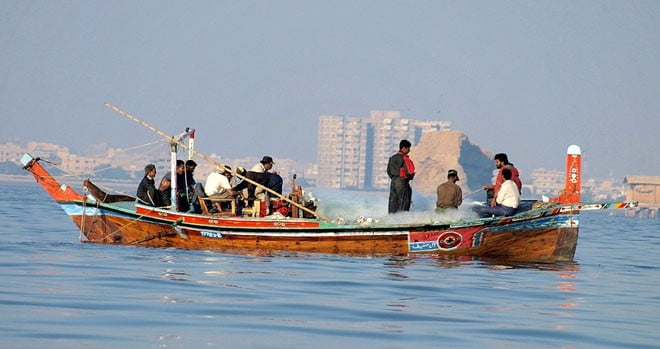

Saturday three in the morning. The deafening silence in the dark Keamari harbour is ruffled by shuffling of parked boats, footsteps, and a few rough gurgles of water. Moments later, one of the boats un-anchors and disappears into the stretch of darkness - with high hopes of returning the next evening with a catch worth boasting for at least a week.
Karachi, Pakistan’s bustling metropolis has a breed of deep-sea fishing enthusiasts who nurture their passion for sportfishing as quietly as they leave for the sea every weekend.
A major sport the world over, in Pakistan deep-sea fishing is surviving on the benevolence of a coterie of serious aficionados who appreciate the tremendous potential nature has bequeathed the coastal stretch of the country.
While fishing for fun has always been a pasttime for people living on the shores of Sindh and Balochistan, the activity has never blossomed as an industry and acquired the level it deserves. People argue that one of the reasons the sport, which is usually a hit in coastal cities around the world, has failed to attract mass following in the country is because the game seems a little expensive to nurture as hobby. The fancy rods and reels and other accessories can be beyond the reach of common people.
Aamir Basrai, a regular sea-goer and fishing enthusiast, agrees that till a few years ago fishing was certainly a rich man’s sport but "ever since Chinese equipments has flooded the local markets, the prices have dropped significantly. Today, one can get a basic rod for Rs 4,000," he adds.
Once sufficiently equipped, the next step is to rent a boat. "For a 24 hours trip to deep-sea, a medium-size trawler charges between Rs 15,000 to 18,000 which includes fuel. The cost is divided among friends as five to eight people can easily travel in a boat," he says.
Experts say the deep-sea range of Karachi is meant for recreational fishing as the sea areas surrounding the port city host a variety of fish that serious sport fisherman around the world aspire to catch.
"Here, one can catch fish that even people in the Caribbean, where the sport is in vague, would call themselves lucky to catch," says Mohammad Moazzam Khan, technical advisor on marine lives at the World Wildlife Fund-Pakistan.
These fishermen sometimes stay on the water for two to three days on customised boats that are also available for rent. "Though not a regular sight, there are fishing boats with toilets and other facilities where people can spend days in a stretch," said Basrai.
Recreational fishermen who have been going to the sea for long say Karachi was close to becoming a guided fishing tours hub in the 1990s and early 2000s, but when the war in Afghanistan started, the budding industry began to lose foreign clients from the US and Europe. "We used to conduct sportfishing tournaments. We hold at least two world records," says Ahmed Rana, a senior sport-fishermen.
Like everything Pakistani these days, the potential deep-sea fishing holds in the country is gradually taking a dip. The vast possibilities of the industry, marine experts say, are being brutally ignored by the government. "There are countries in the Caribbean which rely on the tourism revenues that come from recreational fishing," says Moazzam.
In the United States, recreational fishing is a multi-billion dollar industry. It generates about $30 billion in economic impact annually and supports 350,000 jobs.
"The coasts of Sindh and Balochistan have a lot offer if we can secure them for the tourists -- just travel a few nautical miles from the shores of Karachi and you have marlins, tuna, sword, sailfish, you name it," says Moazzam.
But in Pakistan the marine life is being ravaged by over fishing being done by illegal nets -- "Since we have no overseeing mechanism, commercial over fishing is actually ruining not only the prospect of sports fishing but also the environment," says Moazzam.
The true charm of sportfishing lies in the size of the fish which is spoilt by commercial over fishing. The illegal nets being used for commercial fishing often kill fish at a tadpole stage.
"When you have issues as basic as lack of security, then fighting for marine life or promoting recreational fishing rests low on the priority list," says Moazzam.
However, despite the sad tales that surround sportfishing in Karachi, every weekend, boats leave the shores of Keamari in the darkness with hopes of returning with big catches.